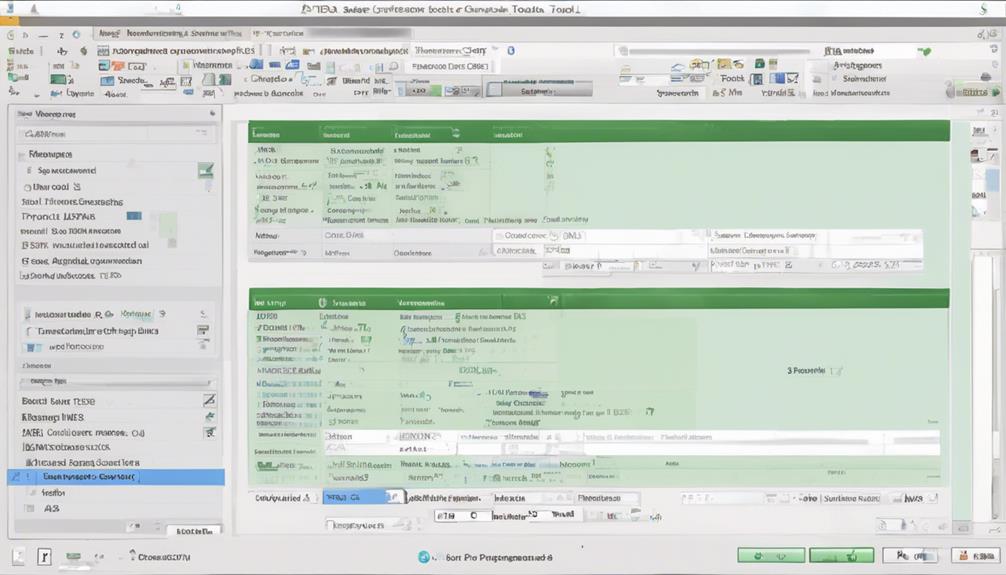In today’s data-driven landscape, it’s fascinating to note that bulk data formatting services play a crucial role in shaping operations across a myriad of industries. From healthcare to finance, retail to manufacturing, these sectors heavily rely on streamlined data processing for various critical functions. As you explore the top 10 industries using bulk data formatting services, you’ll uncover the intricate ways in which accurate data handling impacts performance, compliance, and innovation within each sector.
Healthcare
In the realm of healthcare, the demand for accurate and efficient data formatting services is paramount. Patient records are a crucial component of healthcare operations, and ensuring their proper formatting is essential for effective treatment and continuity of care. Data security is a top concern, with patient confidentiality being a priority in healthcare settings.
Medical billing relies heavily on well-formatted data to streamline the billing process and prevent errors that could lead to financial discrepancies. Compliance regulations, such as HIPAA in the United States, dictate strict guidelines for handling patient information, emphasizing the need for precise data formatting to maintain legal standards and avoid penalties.
Bulk data formatting services play a vital role in healthcare by organizing vast amounts of patient data into structured formats that are easily accessible and secure. By adhering to compliance regulations and prioritizing data security, healthcare organizations can effectively manage patient records and billing processes, ultimately enhancing the quality of care provided to patients.
Finance
Within the realm of finance, the effective management and analysis of data are critical components for success. Financial data analysis plays a key role in shaping investment strategies and making informed decisions. By utilizing bulk data formatting services, financial institutions can streamline their data processes, enabling them to extract valuable insights efficiently.
In the finance sector, regulatory compliance is a top priority. Bulk data formatting services help ensure that data is organized in a compliant manner, assisting in meeting regulatory requirements and avoiding potential penalties.
Moreover, data security is of utmost importance in finance. Safeguarding sensitive financial information is essential to maintain trust with clients and protect against cyber threats. Bulk data formatting services can enhance data security measures by implementing encryption protocols and access controls.
Retail
When it comes to retail, having accurate and well-formatted data is crucial for making informed business decisions. Data formatting techniques play a key role in organizing product information, sales figures, and customer data effectively. By utilizing bulk data formatting services, retailers can streamline their operations, enhance data accuracy, and ultimately improve their overall business performance.
Retail Data Requirements
Frequently, retailers face the challenge of managing vast amounts of data to drive their businesses forward. This data is crucial for effective inventory management and customer segmentation strategies. In the retail industry, data requirements play a pivotal role in shaping decision-making processes and enhancing customer experiences.
- Real-time Inventory Updates: Retailers need accurate and up-to-date information on stock levels to avoid overstock or stockouts.
- Customer Purchase History: Understanding customer buying patterns helps in tailoring promotions and personalized recommendations.
- Store Performance Metrics: Analyzing sales data per store can optimize product placement and marketing efforts.
- Competitor Analysis: Monitoring competitor pricing and promotions assists in staying competitive in the market.
Data Formatting Techniques
Transitioning from understanding the significance of data in retail operations, let’s now explore the critical aspect of data formatting techniques specific to the retail industry. In retail, data formatting techniques involve intricate processes of data manipulation and applying formatting algorithms to ensure data integrity and quality control.
Data manipulation in retail data formatting encompasses tasks like normalizing data formats, standardizing product names, and categorizing items for efficient inventory management. Formatting algorithms play a crucial role in structuring data consistently across various platforms, enabling seamless integration and analysis. These algorithms help in organizing pricing information, customer details, and sales data in a coherent manner.
Data integrity is paramount in the retail sector, where accurate and reliable data drives decision-making processes. Quality control measures ensure that data is error-free, complete, and consistent, enhancing the overall efficiency of retail operations. By implementing robust data formatting techniques, retailers can optimize their workflows, improve inventory accuracy, and provide better customer service.
Benefits for Retailers
Retailers benefit significantly from implementing efficient data formatting services. By utilizing these services, retailers can enhance their operations and customer experiences.
- Improved Customer Segmentation: Data formatting allows retailers to organize customer information effectively, enabling targeted marketing campaigns and personalized promotions based on specific customer demographics, preferences, and purchase history.
- Streamlined Inventory Management: Efficient data formatting services help retailers manage their inventory more effectively by providing real-time insights into stock levels, sales trends, and product performance. This leads to better inventory forecasting, reducing the risk of overstocking or stockouts.
- Enhanced Decision-Making: With properly formatted data, retailers can make informed decisions regarding product selection, pricing strategies, and marketing initiatives based on accurate and up-to-date information.
- Optimized Marketing Strategies: Data formatting services enable retailers to analyze customer behavior patterns and preferences, allowing for the creation of targeted marketing strategies that drive sales and customer loyalty.
Manufacturing
As you explore the realm of manufacturing, it’s crucial to understand the specific data requirements that drive this sector. By implementing tailored data formatting solutions, you can streamline processes, enhance productivity, and optimize resource allocation within manufacturing operations. Ultimately, leveraging bulk data formatting services can significantly boost manufacturing efficiency and contribute to overall business success.
Industry Data Requirements
Manufacturing industries rely heavily on specific data requirements to streamline operations and maximize efficiency. Ensuring compliance with industry standards and maintaining robust data security protocols are paramount in this sector. Data accuracy is crucial for quality control measures to be effective and for decision-making processes to be informed. Here are some key industry data requirements:
- Regulatory Compliance: Manufacturers need to adhere to strict compliance standards to meet legal requirements and industry regulations.
- Data Security Measures: Implementing strong data security protocols is essential to protect sensitive information from cyber threats and unauthorized access.
- Precision in Data Accuracy: Accurate data is fundamental for quality control processes, inventory management, and product traceability.
- Efficient Data Handling: Streamlining data collection, storage, and analysis procedures is vital for optimizing production workflows and enhancing overall operational efficiency.
Data Formatting Solutions
With the increasing reliance on data-driven processes in the manufacturing sector, the need for efficient and accurate data formatting solutions has become more critical than ever. Data formatting automation plays a crucial role in streamlining operations, improving efficiency, and reducing errors in the manufacturing industry. By automating data formatting processes, you can save time and resources while ensuring consistency and accuracy in your data.
To enhance data accuracy, manufacturers must implement robust data security measures to protect sensitive information. Data formatting challenges, such as disparate data sources and varying formats, can hinder operational efficiency. However, with the right data formatting solutions in place, these challenges can be effectively addressed.
Manufacturing Efficiency Enhancement
Enhancing manufacturing efficiency requires a strategic approach that optimizes processes, minimizes waste, and maximizes output. To achieve this, consider the following key strategies:
- Implement Lean Manufacturing Principles: Streamline production processes to eliminate inefficiencies and reduce unnecessary steps, ultimately boosting production optimization.
- Leverage Technology: Integrate advanced technologies like IoT devices and AI-powered analytics to enhance real-time monitoring and decision-making, leading to improved production efficiency.
- Enhance Supply Chain Visibility: Establish transparent communication channels and data sharing capabilities with suppliers and distributors to facilitate better coordination and supply chain improvements.
- Invest in Employee Training: Provide continuous training programs to equip staff with the necessary skills and knowledge to adapt to changing production demands, ensuring a more agile and efficient workforce.
Information Technology
Within the realm of Information Technology, data plays a crucial role in driving decision-making processes and optimizing operational efficiency. Data security is paramount in IT, and organizations rely on bulk data formatting services to ensure that sensitive information is protected through encryption, access controls, and secure transfer protocols. Automation tools are essential in Information Technology to streamline processes, reduce manual errors, and enhance overall productivity. By utilizing bulk data formatting services, IT departments can automate data cleansing, transformation, and integration tasks, leading to increased accuracy and efficiency in managing large datasets.
Furthermore, in Information Technology, the demand for real-time data processing and analysis is ever-increasing. Bulk data formatting services enable IT professionals to efficiently handle vast amounts of data, extract valuable insights, and make informed decisions promptly. The integration of automation tools into data formatting processes accelerates data workflows, allowing IT teams to focus on strategic initiatives and innovation rather than routine manual tasks. In conclusion, the synergy between data security and automation tools within Information Technology underscores the importance of leveraging bulk data formatting services to drive operational excellence.
Telecommunications
Telecommunications sector thrives on its ability to connect individuals and businesses across vast distances, effectively bridging communication gaps.
- Network Optimization: Telecommunications companies rely on bulk data formatting services to streamline and enhance their network operations, ensuring efficient data flow and optimal performance.
- Customer Segmentation: Through the analysis of large sets of data, telecommunications providers can segment their customer base effectively, enabling targeted marketing campaigns and personalized service offerings.
- Data Management: Bulk data formatting services assist in organizing and structuring vast amounts of data generated by telecommunications systems, ensuring easy access and retrieval when needed.
- Operational Efficiency: By utilizing bulk data formatting services, telecom companies can automate processes, reduce manual errors, and improve overall operational efficiency, leading to cost savings and enhanced service delivery.
In the fast-paced world of telecommunications, efficient data handling is crucial for success. Network optimization and customer segmentation are key areas where bulk data formatting services play a vital role in driving operational excellence and delivering exceptional services to customers.
Education
Analyzing data in the education sector is essential for informed decision-making and improving student outcomes. Student records and academic transcripts play a vital role in shaping educational strategies and personalized learning experiences. Bulk data formatting services are increasingly utilized in the education industry to efficiently manage vast amounts of student information. By organizing and structuring student records through data formatting, educational institutions can streamline administrative processes and gain valuable insights into student performance trends.
Moreover, with the rise of online learning and e-learning platforms, the demand for effective data formatting services has surged. Educational organizations rely on these services to ensure seamless integration of student data across various digital platforms, enhancing the overall learning experience. By formatting data related to student progress, assessments, and achievements, educators can tailor their teaching methods to meet individual student needs more effectively.
Transportation
In the realm of transportation, efficient data management is a key factor in ensuring smooth operations and optimizing resources. Transportation data analysis and logistics optimization play a crucial role in enhancing the efficiency of various transportation systems, from trucking companies to airlines. Here are some key ways in which bulk data formatting services benefit the transportation industry:
- Route Optimization: By analyzing data on traffic patterns, weather conditions, and historical route performance, companies can optimize their transportation routes to minimize delivery times and fuel consumption.
- Supply Chain Visibility: Utilizing data formatting services allows transportation companies to have better visibility over their entire supply chain, enabling them to track shipments in real-time and make informed decisions.
- Cost Reduction: Through data analysis, companies can identify cost-saving opportunities such as reducing empty miles, improving fuel efficiency, and streamlining operations.
- Demand Forecasting: By analyzing data on customer demand and market trends, transportation companies can better forecast future transportation needs and adjust their logistics strategies accordingly.
Energy
When it comes to energy data processing, the benefits of formatting cannot be overstated. Efficiently organizing and analyzing energy data can lead to significant cost savings and improved decision-making processes. Stay informed about industry trends to ensure your data formatting services are at the forefront of innovation.
Energy Data Processing
Energy Data Processing involves the collection, organization, and analysis of vast amounts of data related to energy consumption, production, and distribution. This crucial process enables organizations to make informed decisions and optimize their energy usage effectively. Here are some key aspects of Energy Data Processing:
- Monitoring Energy Consumption: Tracking the usage patterns of energy within different systems to identify areas for improvement.
- Analyzing Renewable Resources: Evaluating the utilization of renewable energy sources like solar or wind power to enhance sustainability.
- Predicting Demand: Forecasting future energy needs based on historical data and trends to ensure efficient distribution.
- Optimizing Energy Distribution: Streamlining the delivery of energy to various locations by analyzing data on supply and demand.
Through meticulous data processing, the energy industry can enhance efficiency, reduce costs, and transition towards a more sustainable future by harnessing the power of renewable resources and optimizing energy consumption.
Benefits of Formatting
Enhancing the efficiency of energy data through proper formatting is paramount in maximizing the utility of collected information. Data accuracy is crucial in the energy sector, where even the smallest errors can lead to significant consequences. By utilizing bulk data formatting services, you can ensure that your energy data is organized in a structured and accurate manner, reducing the chances of inaccuracies that could impact decision-making processes.
Efficiency improvement is another key benefit of formatting energy data. By streamlining the formatting process, you can access crucial information quickly and easily, enabling faster analysis and response times. This not only saves time but also allows for more agile decision-making in a fast-paced industry like energy.
Furthermore, cost reduction is a significant advantage of utilizing bulk data formatting services. By automating and standardizing the formatting process, you can reduce manual labor costs and minimize the risk of human error, ultimately saving your organization money in the long run. Overall, the benefits of formatting energy data extend beyond just organization; they lead to improved accuracy, efficiency, cost savings, and time management.
Industry Trends
Amidst the dynamic landscape of the energy sector, staying abreast of industry trends is imperative for organizations seeking to remain competitive and innovative. When it comes to energy, several key trends are shaping the industry:
- Data security, compliance: With the increasing digitization of energy operations, ensuring robust data security measures and compliance with regulations is paramount.
- Data consolidation, integration: The ability to consolidate and integrate data from various sources allows energy companies to gain a comprehensive view of their operations, leading to better decision-making.
- Renewable energy integration: The shift towards renewable energy sources is a prominent trend, with companies focusing on integrating renewables into their energy portfolios.
- Smart grid technologies: Adoption of smart grid technologies is on the rise, enabling better management of energy distribution and consumption.
Government
Within the realm of government data management, the need for efficient and accurate data formatting services is paramount. Government data holds sensitive information that requires stringent data security measures to ensure confidentiality and integrity. Data formatting services play a crucial role in organizing vast amounts of government data into structured and usable formats that can facilitate decision-making processes and policy implementations.
The government sector deals with a myriad of data types ranging from citizen records to financial transactions and legislative documents. Efficient data formatting services streamline these diverse data sets, making them accessible and coherent for various governmental departments. Moreover, data security is a top priority in the government sector, and proper formatting enhances data protection measures by ensuring data accuracy and minimizing errors that could lead to security breaches.
Frequently Asked Questions
What Are the Common Challenges Faced in Implementing Bulk Data Formatting Services in Different Industries?
Implementing bulk data formatting services can present challenges such as maintaining data accuracy and ensuring efficiency improvement. By addressing these issues effectively, industries can streamline their processes and enhance overall performance in managing large volumes of data.
How Can Companies Ensure Data Security and Compliance While Using Bulk Data Formatting Services?
Want to secure data while using bulk formatting services? Ensure data encryption for protection. Monitor compliance to regulations. Regular audits verify security. Implement secure protocols. Train staff on best practices. Stay vigilant for threats.
Are There Any Industry-Specific Regulations or Standards That Need to Be Considered When Formatting Bulk Data?
When formatting bulk data, remember industry-specific regulations and formatting standards. Ensure compliance to safeguard data integrity. Stay informed on sector-specific guidelines for accurate data handling. Prioritize security in data formatting processes to mitigate risks effectively.
What Are the Potential Risks Associated With Outsourcing Bulk Data Formatting Services to Third-Party Providers?
When outsourcing bulk data formatting, data privacy risks arise. Ensure vendor selection aligns with security standards. Assess potential breaches, unauthorized access, and data leaks. Mitigate risks through robust contracts, secure data transfer protocols, and ongoing monitoring.
How Can Businesses Measure the Effectiveness and ROI of Using Bulk Data Formatting Services Across Various Industries?
To measure the effectiveness and ROI of bulk data formatting services, assess performance metrics like time saved, error reduction, and cost efficiency. Ensure data security and compliance by implementing encryption protocols and regular audits.



